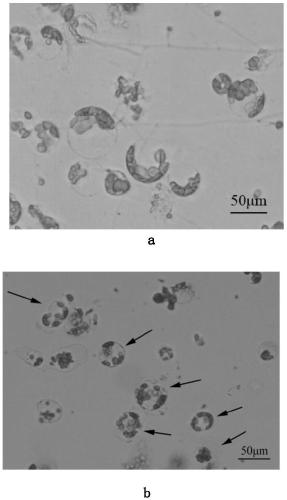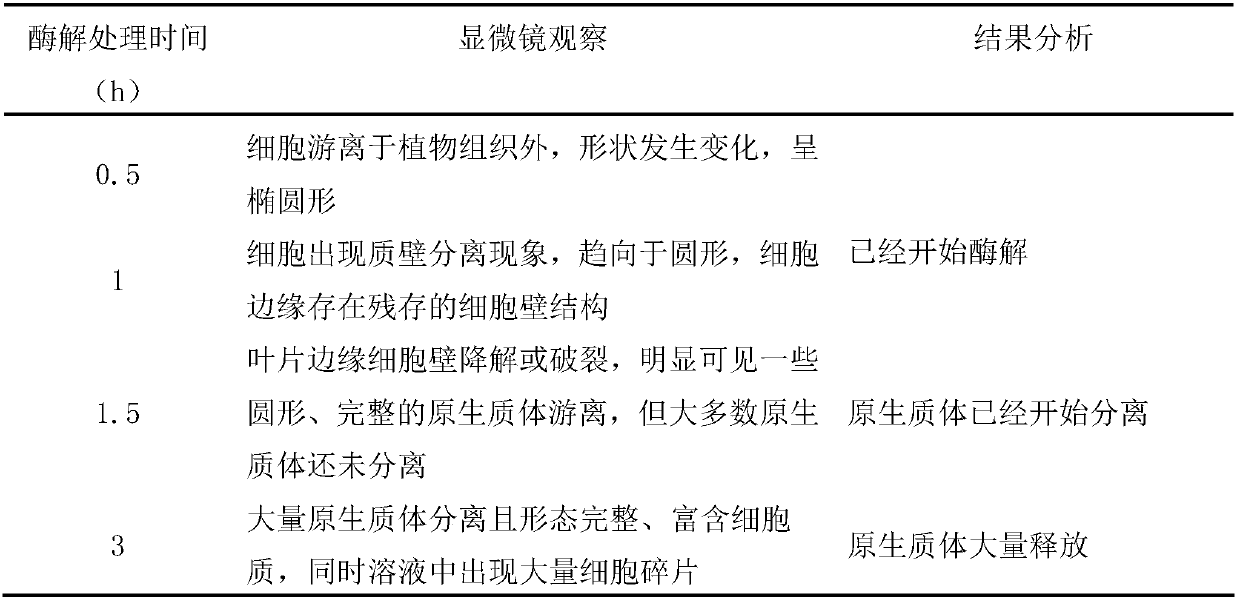Preparing method of carnation leaf protoplast
A protoplast and carnation technology, applied in the field of plant tissue and cell culture, can solve the problems of low yield, achieve high yield, shorten enzymatic hydrolysis time, and improve genetic traits
- Summary
- Abstract
- Description
- Claims
- Application Information
AI Technical Summary
Problems solved by technology
Method used
Image
Examples
Embodiment 1
[0039] The preparation method of embodiment 1 carnation leaf protoplast
[0040] The present embodiment provides the method for the separation and purification of carnation leaf protoplasts, said method comprising the following steps:
[0041] A preparation method for carnation leaf protoplasts, comprising the following steps:
[0042] (1) Preparation of plant material: In the sunny and dry morning, shoots of carnation plants grown in the field were collected. Properly cut off the leaves, wash them with washing powder water first, then rinse them under running water for about 1 hour, and then carry out disinfection treatment on the ultra-clean workbench. The process is as follows: first, soak the tender shoots in a jar of 2% sodium hypochlorite solution for 30 minutes, shake it properly for 5-6 times during the soaking, and wash it with sterile water for 3 times after soaking; then use 75% sodium hypochlorite solution Soak in ethanol for 30s, rinse with sterile water 2-3 tim...
Embodiment 2
[0052] The influence of embodiment 2 different enzymolysis time on carnation leaf protoplast preparation
[0053] For the enzymatic hydrolysis treatment in Example 1, the present invention sets 5 gradient enzymatic hydrolysis times, namely: 0.5h, 1h, 1.5h, 3h, and 4h. The enzymolysis mixture treated by enzymolysis was subjected to microscopic examination to observe the state of release of protoplasts (see Table 1). The results showed that the protoplasts were released in large quantities after 3 hours of enzymatic hydrolysis, and part of the protoplasts began to be damaged at 4 hours. Therefore, the suitable time for enzymatic hydrolysis of protoplasts was 3h-4h, and should not exceed 4h as far as possible. 3.5h enzymatic hydrolysis time is the best enzymatic hydrolysis time (see Table 1).
[0054] Table 1 The release status of protoplasts from carnation leaves after different enzymatic hydrolysis time treatments
[0055]
[0056]
Embodiment 3
[0057] The influence of embodiment 3 different enzyme concentration ratios on carnation leaf protoplast preparation
[0058] For the enzymolysis treatment in embodiment 1, the present invention sets the concentration test of the cellulase of four kinds of levels, is respectively 0.5%, 1.0%, 1.5%, 2.0%, the test of the pectinase concentration level of three levels, They are 0.1%, 0.2%, and 0.5%, respectively. According to the test conditions of each group, the enzymatic hydrolysis was carried out, and the yield and activity of protoplasts were counted. The results are shown in Table 2. It can be seen from Table 2 that in combination 8 under comprehensive conditions, that is, when the enzyme concentration ratio is 1.5% cellulase + 0.2% pectinase, the yield of protoplasts is the highest, up to 183 × 10 5 Each / gFW is about, and the activity of protoplasts is also higher than 90%, reaching 94.26% (see Table 2).
[0059] Table 2 Effects of different enzyme concentration combinati...
PUM
 Login to View More
Login to View More Abstract
Description
Claims
Application Information
 Login to View More
Login to View More - R&D
- Intellectual Property
- Life Sciences
- Materials
- Tech Scout
- Unparalleled Data Quality
- Higher Quality Content
- 60% Fewer Hallucinations
Browse by: Latest US Patents, China's latest patents, Technical Efficacy Thesaurus, Application Domain, Technology Topic, Popular Technical Reports.
© 2025 PatSnap. All rights reserved.Legal|Privacy policy|Modern Slavery Act Transparency Statement|Sitemap|About US| Contact US: help@patsnap.com



